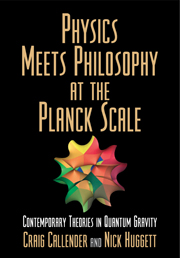Book contents
- Frontmatter
- Contents
- Preface
- 1 Introduction
- Part I Theories of Quantum Gravity and their Philosophical Dimensions
- Part II Strings
- Part III Topological Quantum Field Theory
- 8 Higher-dimensional algebra and Planck scale physics
- Part IV Quantum Gravity and the Interpretation of General Relativity
- Part V Quantum Gravity and the Interpretation of Quantum Mechanics
- References
- Notes on contributors
- Index
8 - Higher-dimensional algebra and Planck scale physics
Published online by Cambridge University Press: 15 December 2009
- Frontmatter
- Contents
- Preface
- 1 Introduction
- Part I Theories of Quantum Gravity and their Philosophical Dimensions
- Part II Strings
- Part III Topological Quantum Field Theory
- 8 Higher-dimensional algebra and Planck scale physics
- Part IV Quantum Gravity and the Interpretation of General Relativity
- Part V Quantum Gravity and the Interpretation of Quantum Mechanics
- References
- Notes on contributors
- Index
Summary
Introduction
At present, our physical worldview is deeply schizophrenic. We have, not one, but two fundamental theories of the physical universe: general relativity, and the Standard Model of particle physics based on quantum field theory. The former takes gravity into account but ignores quantum mechanics, while the latter takes quantum mechanics into account but ignores gravity. In other words, the former recognizes that spacetime is curved but neglects the uncertainty principle, while the latter takes the uncertainty principle into account but pretends that spacetime is flat. Both theories have been spectacularly successful in their own domain, but neither can be anything more than an approximation to the truth. Clearly some synthesis is needed: at the very least, a theory of quantum gravity, which might or might not be part of an overarching ‘theory of everything’. Unfortunately, attempts to achieve this synthesis have not yet succeeded.
Modern theoretical physics is difficult to understand for anyone outside the subject. Can philosophers really contribute to the project of reconciling general relativity and quantum field theory? Or is this a technical business best left to the experts? I would argue for the former. General relativity and quantum field theory are based on some profound insights about the nature of reality. These insights are crystallized in the form of mathematics, but there is a limit to how much progress we can make by just playing around with this mathematics.
- Type
- Chapter
- Information
- Physics Meets Philosophy at the Planck ScaleContemporary Theories in Quantum Gravity, pp. 177 - 196Publisher: Cambridge University PressPrint publication year: 2001
- 14
- Cited by

